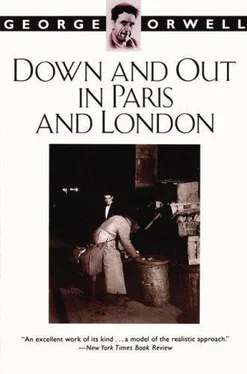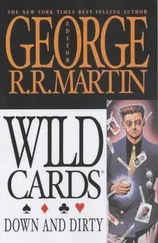George Orwell - Down and Out in Paris and London
Здесь есть возможность читать онлайн «George Orwell - Down and Out in Paris and London» весь текст электронной книги совершенно бесплатно (целиком полную версию без сокращений). В некоторых случаях можно слушать аудио, скачать через торрент в формате fb2 и присутствует краткое содержание. Жанр: Старинная литература, на русском языке. Описание произведения, (предисловие) а так же отзывы посетителей доступны на портале библиотеки ЛибКат.
- Название:Down and Out in Paris and London
- Автор:
- Жанр:
- Год:неизвестен
- ISBN:нет данных
- Рейтинг книги:5 / 5. Голосов: 1
-
Избранное:Добавить в избранное
- Отзывы:
-
Ваша оценка:
- 100
- 1
- 2
- 3
- 4
- 5
Down and Out in Paris and London: краткое содержание, описание и аннотация
Предлагаем к чтению аннотацию, описание, краткое содержание или предисловие (зависит от того, что написал сам автор книги «Down and Out in Paris and London»). Если вы не нашли необходимую информацию о книге — напишите в комментариях, мы постараемся отыскать её.
Down and Out in Paris and London — читать онлайн бесплатно полную книгу (весь текст) целиком
Ниже представлен текст книги, разбитый по страницам. Система сохранения места последней прочитанной страницы, позволяет с удобством читать онлайн бесплатно книгу «Down and Out in Paris and London», без необходимости каждый раз заново искать на чём Вы остановились. Поставьте закладку, и сможете в любой момент перейти на страницу, на которой закончили чтение.
Интервал:
Закладка:
care for a lay-up of seven days?" etc. etc.
It seemed that his whole life was this-a round of
mooching, drunks and lay-ups. He laughed as he talked of
it, taking it all for a tremendous joke. He looked as though
he made a poor thing out of begging, for he wore only a
corduroy suit, scarf and capno socks or linen. Still, he was
fat and jolly, and he even smelt of beer, a most unusual
smell in a tramp nowadays.
Two of the tramps had been in Cromley spike recently,
and they told a ghost story connected with it. Years
earlier, they said, there had been a suicide there.
A tramp had managed to smuggle a razor into his cell, and
there cut his throat. In the morning, when the Tramp
Major came round, the body was jammed against the door,
and to open it they had to break the dead man's arm. In
revenge for this, the dead man haunted his cell, and
anyone who slept there was certain to die within the year;
there were copious instances, of course. If a cell door
stuck when you tried to open it, you should avoid that cell
like the plague, for it was the haunted one.
Two tramps, ex-sailors, told another grisly story. A
man (they swore they had known him) had planned to
stow away on a boat bound for Chile. It was laden with
manufactured goods packed in big wooden crates, and
with the help of a docker the stowaway had managed to
hide himself in one of these. But the docker had made a
mistake about the order in which the crates were to be
loaded. The crane gripped the stowaway, swung him aloft,
and deposited him-at the very bottom of the hold, beneath
hundreds of crates. No one discovered what had happened
until the end of the voyage, when they found the
stowaway rotting, dead of suffocation.
Another tramp told the story of Gilderoy, the Scottish
robber. Gilderoy was the man who was condemned to be
hanged, escaped, captured the judge who had sentenced
him, and (splendid fellow!) hanged him. The tramps liked
the story, of course, but the interesting thing was to see
that they had got it all wrong. Their version was that
Gilderoy escaped to America, whereas in reality he was
recaptured and put to death. The story had been amended,
no doubt deliberately; just as children amend the stories of
Samson and Robin Hood, giving them happy endings
which are quite imaginary.
This set the tramps talking about history, and a very
old man declared that the "one bite law" was a survival
from days when the nobles hunted men instead of deer.
Some of the others laughed at him, but he had the idea
firm in his head. He had heard, too, of the Corn Laws,
and the
jus primae noctis (he believed it had really
existed); also of the Great Rebellion, which he thought
was a rebellion of poor against rich-perhaps he had got it
mixed up with the peasant rebellions. I doubt whether
the old man could read, and certainly he was not
repeating newspaper articles. His scraps of history had
been passed from generation to generation of tramps,
perhaps for centuries in some cases. It was oral tradition
lingering on, like a faint echo from the Middle Ages.
Paddy and I went to the spike at six in the evening,
getting out at ten in the morning. It was much like
Romton and Edbury, and we saw nothing of the ghost.
Among the casuals were two young men named William
and Fred, ex-fishermen from Norfolk, a lively pair and
fond of singing. They had a song called "Unhappy Bella"
that is worth writing down. I heard them sing it half a
dozen times during the next two days, and I managed to
get it by heart, except a line or two which I have guessed.
It ran:
Bella was young and Bella was fair With
bright blue eyes and golden hair, O
unhappy Bella!
Her step was light and her heart was gay, But
she had no sense, and one fine day She got
herself put in the family way
By a wicked, heartless, cruel deceiver.
Poor Bella was young, she didn't believe That
the world is hard and men deceive, 0 unhappy
Bella!
She said, "My man will do what's just, He'll
marry me now, because he must"; Her heart
was full of loving trust
In a wicked, heartless, cruel deceiver.
She went to his house; that dirty skunk Had
packed his bags and done a bunk, O unhappy
Bella!
Her landlady said, "Get out, you whore,
I won't have your sort a-darkening my door." Poor
Bella was put to affliction sore
By a wicked, heartless, cruel deceiver.
All night she tramped the cruel snows, What she
must have suffered nobody knows, O unhappy
Bella!
And when the morning dawned so red, Alas,
alas, poor Bella was dead,
Sent so young to her lonely bed
By a wicked, heartless, cruel deceiver.
So thus, you see, do what you will, The
fruits of sin are suffering still, O unhappy
Bella!
As into the grave they laid her low, The men
said, "Alas, but life is so," But the women
chanted, sweet and low, "It's all the men, the
dirty bastards!"
Written by a woman, perhaps.
William and Fred, the singers of this song, were
thorough scallywags, the sort of men who get tramps a
bad name. They happened to know that the Tramp Major
at Cromley had a stock of old clothes, which were to be
given at need to casuals. Before going in William and
Fred took off their boots, ripped the seams and cut
pieces off the soles, more or less ruining them. Then they
applied for two pairs of boots, and the Tramp Major,
seeing how bad their boots were, gave them almost new
pairs. William and Fred were scarcely
outside the spike in the morning before they had sold
these boots for one and ninepence. It seemed to them
quite worth while, for one and ninepence, to make their
own boots practically unwearable.
Leaving the spike, we all started southward, a long
slouching procession, for Lower Binfield and Ide Hill. On
the way there was a fight between two of the tramps.
They had quarrelled overnight (there was some silly
casus
belli
about one saying to the other, "Bull shit," which was
taken for Bolshevik-a deadly insult), and they fought it
out in a field. A dozen of us stayed to watch them. The
scene sticks in my mind for one thing -the man who was
beaten going down, and his cap falling off and showing
that his hair was quite white. After that some of us
intervened and stopped the fight. Paddy had meanwhile
been making inquiries, and found that the real cause of
the quarrel was, as usual, a few pennyworth of food.
We got to Lower Binfield quite early, and Paddy filled
in the time by asking for work at back doors. At one
house he was given some boxes to chop up for firewood,
and, saying he had a mate outside, he brought me in and
we did the work together. When it was done the
householder told the maid to take us out a cup of tea. I
remember the terrified way in which she brought it out,
and then, losing her courage, set the cups down on the
path and bolted back to the house, shutting herself in
the kitchen. So dreadful is the name of "tramp." They
paid us sixpence each, and we bought a threepenny loaf
and half an ounce of tobacco, leaving fivepence.
Paddy thought it wiser to bury our fivepence, for the
Tramp Major at Lower Binfield was renowned as a tyrant
and might refuse to admit us if we had any money at all.
It is quite a common practice of tramps
Читать дальшеИнтервал:
Закладка:
Похожие книги на «Down and Out in Paris and London»
Представляем Вашему вниманию похожие книги на «Down and Out in Paris and London» списком для выбора. Мы отобрали схожую по названию и смыслу литературу в надежде предоставить читателям больше вариантов отыскать новые, интересные, ещё непрочитанные произведения.
Обсуждение, отзывы о книге «Down and Out in Paris and London» и просто собственные мнения читателей. Оставьте ваши комментарии, напишите, что Вы думаете о произведении, его смысле или главных героях. Укажите что конкретно понравилось, а что нет, и почему Вы так считаете.












